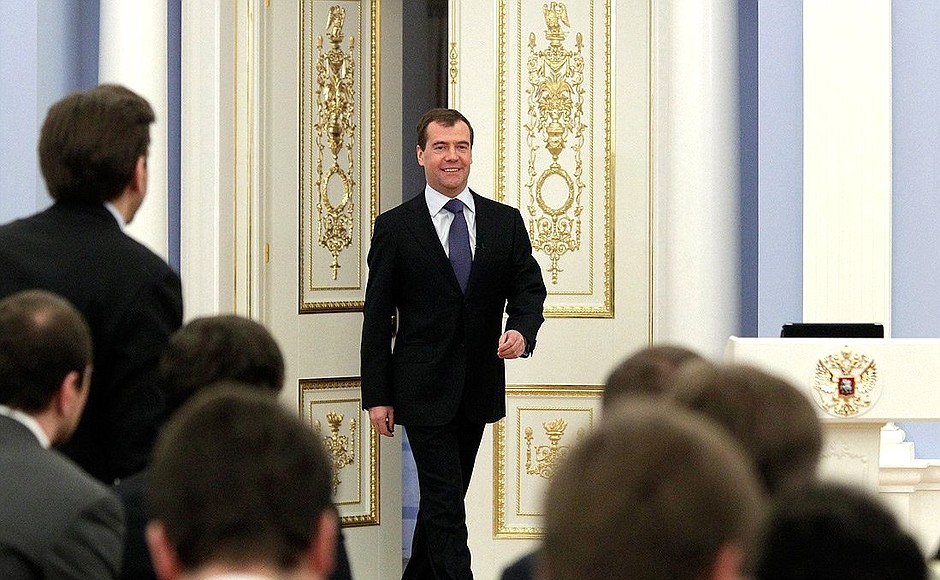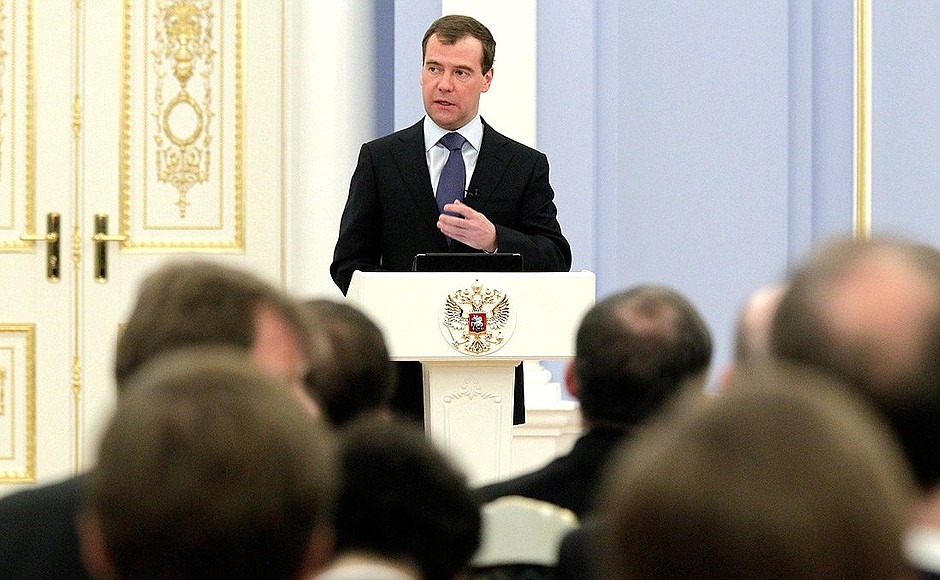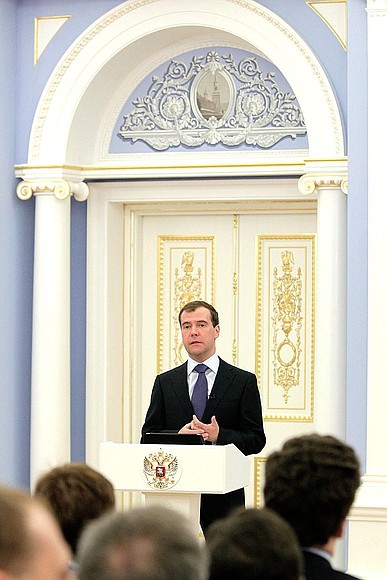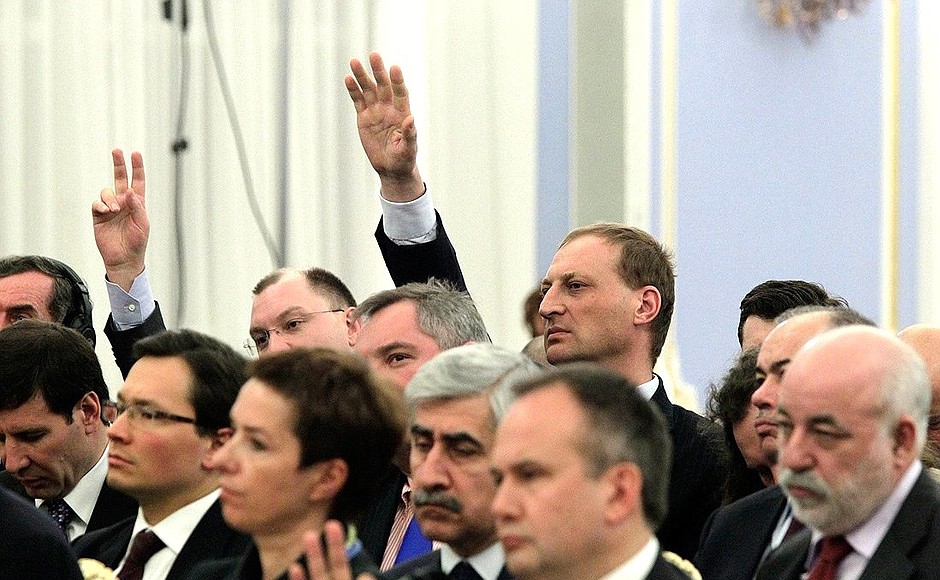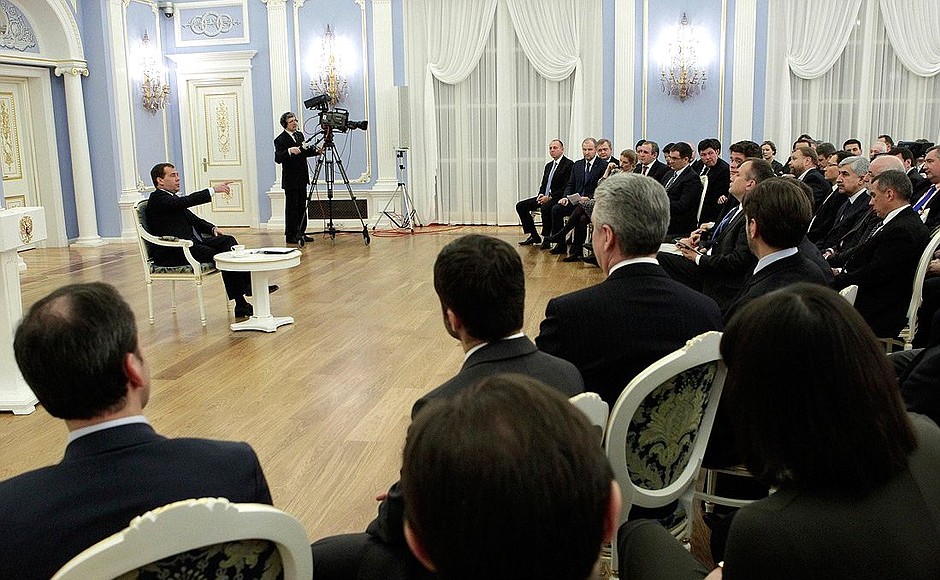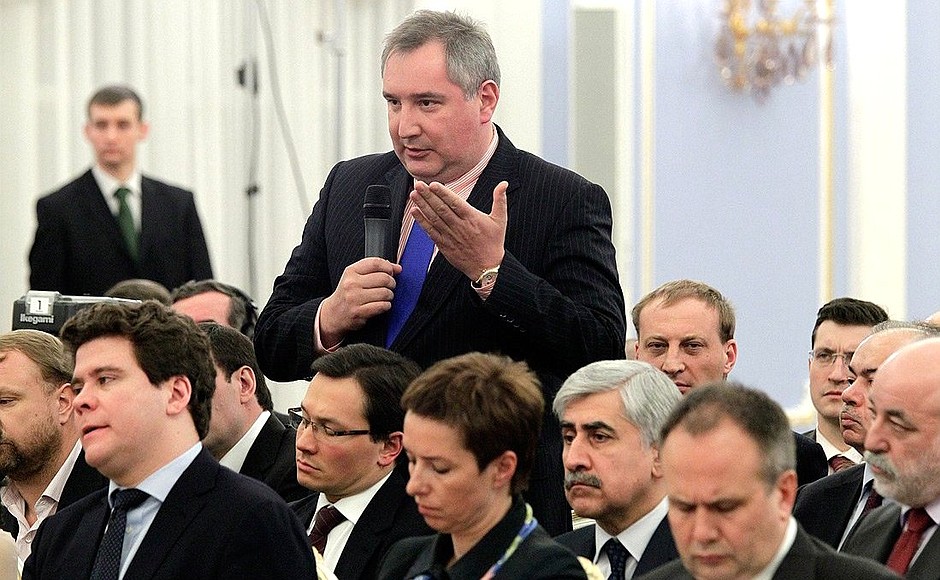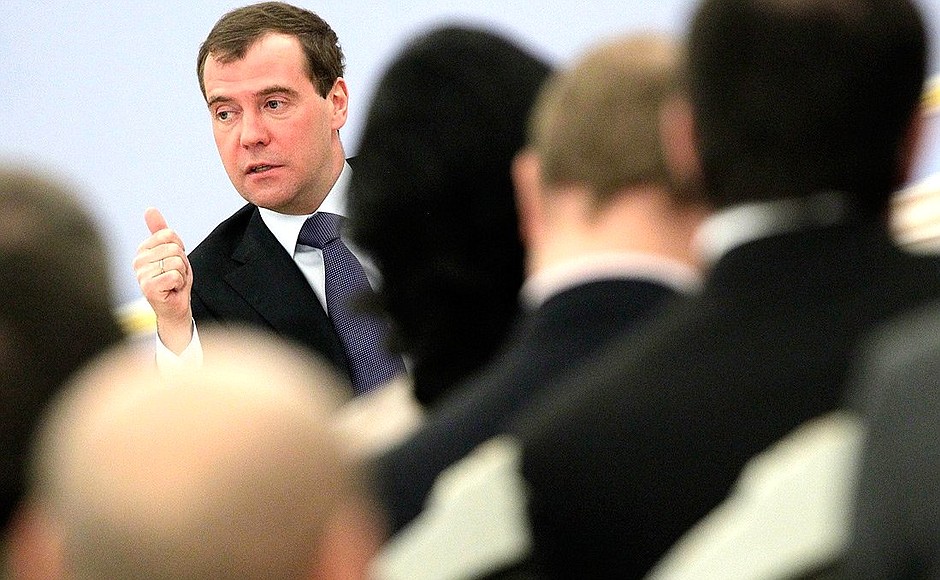* * *
Excerpts from transcript of meeting with members of the Public Supporters’ Committee
President of Russia Dmitry Medvedev: Good afternoon, colleagues.
First of all, I am very happy to see you. I offer you all my best New Year’s wishes, since our previous meeting was just after the State Duma election. The public committee was set up in the run-up to the State Duma election, but its objectives are much more long-term than that.
The committee is an independent public body established with the purpose of facilitating cooperation with civil society. As well-known and popular people representing various civil society and state organisations, you are yourselves communicators and can help to carry out this communication.
This is not our first meeting and we have already covered a lot of ground in our discussions. It must be said that we have seen some big changes in the country since last time we met. Life has become merrier. Actually, this is what I propose discussing today. I would like to hear your views on the reforms of the political system that I outlined in my Presidential Address [to the Federal Assembly].
As you know, the main purpose of these reforms is to make it possible for our people to exercise their civic rights more fully, above all their political rights, and remove the hurdles that are obstructing our political system’s development. It is obvious today that not all of our people see the officially registered political parties as their actual or formal representatives.
Life has changed. Tougher rules on registration of political parties made sense during the time when we were in the process of building our party system. These demands were justified because we first had to set the foundations of the new political model in place.
”Simplifying the party registration rules is just the first part of our political modernisation package.“
But civic activity has increased dramatically since then. People have changed over this time and now seek clearer representation of their views and better forms of expressing their opinions. We have to take these changes into account, and we see today that the strict registration demands are preventing smaller organisations from being able to register.
Simplifying the party registration rules is just the first part of our political modernisation package. I want you, as my supporters and colleagues, to understand that this whole undertaking is not some disparate handful of random measures put together only in December or some time later.
These reforms are based on deep reflection and considered views. As I noted in discussions I have had with various public organisations and people, a number of the draft laws that I submitted to the State Duma were in fact drawn up back in May and June, so now they will be enacted right on time.
They cannot be ranked in terms of importance but are all equally important. They are a package of measures. I am not suggesting, however, that this package should not be further discussed or is ideal. Of course it must be the object of thorough examination and discussion in the State Duma, and with civil society representatives too.
The return to direct election of regional heads and expanded regional representation in the State Duma are, of course, fundamental steps for our democracy’s advancement. These steps aim to give our people more freedoms and set our system on a new qualitative level in its development.
”The return to direct election of regional heads and expanded regional representation in the State Duma are fundamental steps for our democracy’s advancement. These steps aim to give our people more freedoms and set our system on a new qualitative level in its development.“
Three draft laws are currently before the State Duma. I imagine that you have already familiarised yourselves with their contents. Those among you who are Duma members certainly have, anyway. The regional governors have also read through the provisions of interest to them, though they may not be as well-informed overall about all of the package’s proposals.
I had a telling experience just recently in this respect. I visited the [Moscow State University] journalism faculty. The students there are an active lot and were not happy at the fact that the first time I came, I met with students from other universities, and so they asked me to come again and meet with them this time. I took up their invitation. An active discussion of various laws began, and one of the things said was, ‘So, the draft law on electing governors is about putting a presidential filter or something such in place’.
And I said, ‘Wait a moment, what about candidates standing as independents?’, but they hadn’t even heard that the draft law allows for such a thing. What does this tell us? After all, we are talking about an active and well-informed social group here, journalism students studying at a very serious faculty. What this tells us is that we are not using even a tenth of the possibilities we should be using to inform the public about these draft laws, get discussion on them going, and, ultimately, get them passed. Whatever the situation, these draft laws should be passed and come into force no later than May.
Work is near completion on the draft law on elections to the State Duma. I remind you that we plan to divide the country into 225 territorial units roughly equal in the number of voters. All registered political parties – and there will probably be quite a few of them – will be freed from having to collect signatures, which will make it a lot easier to get party lists registered. The procedures for submitting documents to the Central Election Commission will also become simpler. Under the draft law, not only political parties but also individual candidates running in the elections will be able to set up election funds.
Of course, the issue on everyone’s minds at the moment, and justifiably so, is the need to ensure better guarantees that elections will be transparent and open. The draft law moves forward in this sense too by making it possible for election observers to film and photograph proceedings in the polling stations. This is very important because these are the means usually used to record evidence of violations, or to attempt to manipulate public opinion in some cases. The draft law’s provisions guarantee the possibility of non-stop online video-casting of voting and vote-counting at the polling stations. I hope this draft law will prove its worth, and I hope too, of course, that those of you representing the State Duma will improve it further.
Let me briefly mention a few more issues.
First, it is absolutely essential that we continue work on the updated 2020 Strategy programme. I hope that this strategy will soon be ready for the executive authorities to use as an action plan.
Second, we have had very productive discussions on decentralisation in the regional development context. This work continues, no matter what people might say or write, but thanks to your proposals, we will be able to carry out this big undertaking in quicker time.
Third, we still have to improve the competitive environment in business. We have spoken many times about administrative barriers and the need for additional incentives for business development. This work must continue of course.
I imagine that you will raise other important areas of concern to our people today. I am pleased to see that the website большоеправительство.рф [big government] is now up and running and has already received more than 3,000 proposals. I hope they will all be thoroughly analysed.
Other interesting resources have appeared too now. One of them we announced at the Commission for Modernisation [and Technological Development of Russia’s Economy] meeting. I am referring to the site россиябездураков.рф [Russia without idiots], which has already drawn 2 million responses and had more than 2 million visitors over these last few weeks.
Of course, it is important that this site not just collect stories of stupidity but also serve as a tool to ensure that this stupidity becomes a thing of the past, or that we at least minimise these cases and make them public, because when they become public knowledge civil servants themselves can take action to fix the situation in many instances.
We still have many important events ahead, first and foremost of which is the presidential election. It is important in general to get modern-thinking people into government, as I have said on many occasions during this and other campaigns.
We have got this process started even amongst you here today. Two of our colleagues have now moved into state office – Deputy Prime Minister Dmitry Rogozin, and Mikhail Abyzov, the Public Committee’s coordinator, who recently became my adviser.
As was agreed, we will continue to make new appointments. We should make more active use of the human resources pool in drawing up the lists of candidates for various posts, including the election to boards of directors of companies in which the state holds a stake.
We are now working on putting the Open Government into place. The Presidential Executive Office and the Government are both working on this, independently of whatever changes might take place in their organisation. I will sign a special order this week setting up a working group on the Open Government project under the direction of Chief of Staff of the Presidential Executive Office [Sergei Ivanov].
”I believe that, no doubt, Russia absolutely must have a strong right-wing party. It’s unfortunate that we do not have such a party and that in its present day shape one can barely notice it in the political landscape. It would be very good if this right-leaning party sat in the State Duma, for example, so that the State Duma could represent a full spectrum of peoples’ political preferences.“
The working group’s task will be to set out the Open Government’s work principles and coordinate them with the Government’s work priorities. Of course, for the whole idea to be implemented, as we realise, the corresponding legal framework will have to be put in place too.
Another interesting idea that we can discuss is the international initiative Open Government Partnership. This initiative’s aim is to fight corruption and ensure transparent government, get the public involved in this work, improve the quality of public services, and make management of state resources more effective. The partnership was set up at several countries’ initiative. I think we should discuss the possibility of our taking part too because this could be of interest for Russia. That is a brief list of issues to go on with for now.
* * *
I have spoken about the issue of a right-wing party many times. You know, I believe that, no doubt, Russia absolutely must have a strong right-wing party. It’s unfortunate that we do not have such a party and that in its present day shape one can barely notice it in the political landscape. It would be very good if this right-leaning party sat in the State Duma, for example, so that the State Duma could represent a full spectrum of peoples’ political preferences. Moreover, I even think it is possible that if the right-wing party made it into the State Duma, perhaps the number of unhappy individuals, those who are called ‘angry city-folks’, would be smaller, simply because they would understand that there is a political force representing them better than anyone else. So this Right Project is quite necessary.
Why did it fail? In short, it is because of its leaders. They took a start, but then they slowed down. By the way, I discussed the subject with various people, including [former Finance Minister] Mr Kudrin, suggesting him to support at some point the right-wing movement, but our colleague preferred his job in the Cabinet at the time. Now, we are hearing a myth supported quite actively by Mr Kudrin himself, that he was some kind of oppositionist who sat within the Government for 12 years in defiance and promoted right-leaning values in all possible ways, liberal values, as a bulwark of a reliable macroeconomic stability.
Everyone who has worked in the Government, as well as those who never did, certainly know that a Finance Minister is an important figure. But we also have the Prime Minister, and finally, the President. If, at some point, our ideas had diverged, for example, with those of the Finance Minister or the Economic Development Minister, then the result would have been clear, since it is impossible, being part of a team, to play against this same team. Indeed, it was never the case for the former Finance Minister [Kudrin], as his signature is at the bottom of every financial document issued by the Cabinet, every single one, including documents that concern expenditures on weapons and so on – the things he is criticising actively now.
Thus, I don’t think this [Mr Kudrin’s] portrait of an implacable warrior for liberal values fully corresponds with reality. On the contrary, the former Finance Minister is fully responsible for everything that happened in the country, alongside other members of the Cabinet. He is not any kind of oppositionist; he is a person who, at a certain point, was given leave from the Government for quite obvious reasons. Will he be able to launch a right-wing party, I do not know. I will nevertheless say again, I would be very happy if such a party were to come into being, but it must be headed by strong-spirited individuals supported by part of the population that is sympathetic to right-leaning values, and not just people who worked at some posts at some points. I hope that sooner or later, such right leaders will emerge.
* * *
As far as the militarisation of the Saakashvili regime is concerned, I must say the following. Frankly speaking, this militarisation never ceased, even after the so-called five-day war. Moreover, we received information that all sorts of weapons continued to be supplied almost incessantly, both by the administration of United States of America and by some other nations, including some of our close neighbours. That is precisely why we had to build up our military bases in Abkhazia and South Ossetia, so now they are in a position to defend the interests of these two small states, as well as Russian interests, very effectively, stocked with sufficient weapons capable of doing disproportionate damage to any aggressor. This message is adequately understood; even the crazy Saakashvili understands it.
But unfortunately, we cannot forbid other states to supply arms to Georgia. It is no secret we discuss this problem openly, and I specifically spoke about it with several heads of state, saying, ‘What are you doing? This is simply dangerous’. But naturally, we cannot fully prevent such supplies, hence we must keep this in mind in pursuing our policies in the future. But it is certain we do not have any weaknesses in this regard. Everything is in place.
* * *
It is true that we need some fresh air in our politics. But it is preferable that we do not catch a cold from it. Certainly, we must be prepared for how these processes will unwind in our country. We understand that competition is currently somewhat restricted, and at the same time, there is much support for paternalism… You may say: the spirit of legitimacy, all responsibility lies with the President, whatever happens, he is the one we must call on. But that is our history. We still have not gotten past this framework; we still cannot break down this paradigm of our national development, while our goal is, indeed, to promote self-identification, so that a significant proportion of our people come to rely on themselves. You say, for example, that municipalities are dependent, that the governors are commanding them. Well, this has the same cause, because it is a question of reasoning, a matter of the municipalities’ true authorities, as well as the responsibilities the governors are still subject to. But the people themselves must ultimately understand that municipalities are where the main events concerning them happen. Then, when we create right conditions, we will have a modern system of governance and municipal self-administration.
And the last thing I would like to say is, you are right, we must take into account the federal nature of our state as much as possible; we cannot manage everything from Moscow. There should be some reasonable degree of universalization, while at the same time, we can allow some room for manoeuvring everywhere including the political system.
* * *
”Access to information is a most important value in today’s world, no less important than access to material benefits, food and housing. We must certainly do everything to narrow the inequality in this respect as much as possible, or eliminate it all together.“
The state presence in the economy remains ever-relevant for us. We talk about it a great deal and, unfortunately, in recent years, we have not done as much as we should have. Thus, if I start working on these issues, I can tell you that we will carry out all plans for privatisation to the end, even if there is some resistance, regardless of what people say, because we also have to do this for ideological reasons, so there is no reason to hesitate.
* * *
Access to information is a most important value in today’s world, no less important than access to material benefits, food and housing. We must certainly do everything to narrow the inequality in this respect as much as possible, or eliminate it all together. Incidentally, this is also a question of so-called digital inequality, because the problem of digital inequality within the framework of our entire nation is pressing indeed, as regardless of how you put it, Moscow is much different from Anadyr which is a great place too, of course, but these are enormous distances between the two, and we must employ most advanced technologies to cover the gaps.
* * *
I am not an expert on public television. But I am consciously reviving this topic, although many have told me, ‘The time has passed, we don’t need it anymore because we have the Internet and social networks’. But at the same time, we are rebuked that the government media are not free, that they are advocating only a certain group of individuals, that they do not reflect a full picture of the world. So at one point, I simply thought, if at least some of our people hold this opinion, let’s create something that will be financed by other means. The question is, how? And that is precisely what we are working on now. I have instructed a team to work on corresponding documents.
I am also not entirely clear on the question of what this television should be like. But I think even with all the respect given to, say, BBC, we must not strive to replicate the BBC or other existing system. We must move someplace forward, including interactive functions, modern means of communications. True, we must figure out what funding will be used for this public television because, as I have said before, it is unlikely we will be able to explain to our citizens, many of whom are not wealthy, why they must pay a tax, even if it is a small one, when they buy a TV set or in some other situation.
But we need an idea for finding an alternative source of financing unrelated to big business, because otherwise, it will not be public television, but rather, regular private television, which we already had and have now, and which has its own merits and shortcomings. So now, we are to answer all these questions. Still, I believe that if the query is made, an answer must be found. And I think we will find it.
* * *
Colleagues, I truly appreciate that you are here today. I very much hope that our work will continue within the framework of a public project, which is called Free Government, and within the framework of our regular Government. If all the conditions for it fall into place, I hope that some of the people present will work within a relatively small team, in one capacity or another, or help this team, because it is very important for our government to be modern. And we are modern people, as our discussion today has demonstrated.
Thank you very much. Goodbye.
